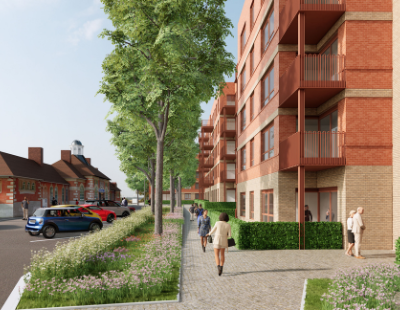Even if work on site stops, design consultants like architects are expected to continue with their services and to continue to maintain resource for their projects. While architects have received some government support in the form of the furlough scheme, their resource costs on delayed projects have continued to build up.
Brexit and Covid disruption causing delays in the delivery of materials, as well as cost increases, have put many developers under financial pressure, ‘which some are pushing on to their project teams’.
As a result, Boodle Hatfield says that architects are now more and more willing to take the unusual step of pursuing legal action over unpaid costs. In some cases, they are even exercising their contractual or statutory rights to suspend work on projects.
The law firm warns that this can damage the working relationship between architects and developers, while also potentially leading to ‘entrenched adversarial positions’.
In the past, architects have traditionally been reluctant to robustly enforce their contractual rights, but due to the economic pressures of the pandemic, they are increasingly being forced to take stronger measures to recover fees.
In addition, architects have seen professional indemnity insurance premiums rise in the wake of the Grenfell tragedy, and more generally a hard PI market, which has put pressure on their bottom lines.
“Prior to coronavirus, it would have been extremely rare for an architect to pursue formal legal remedies against clients, but it’s now becoming a more common occurrence,” John Wevill, partner at Boodle Hatfield, said.
“Developers are feeling the squeeze and some look to preserve their own cash flow by delaying fee payments or disputing legitimate claims for additional fees. However, architects are pushing back quite forcefully in many cases.”
Wevill added: “There’s no doubt that coronavirus has raised considerable challenges across the industry and we would always encourage developers and architects to engage collaboratively in discussions on fees as soon as an issue arises. This will give both parties the best opportunity to find solutions that will help them avoid becoming caught up in costly legal action.”
Navpreet Atwal, partner at Boodle Hatfield, commented: “Traditionally, developers have favoured working with the same architects across different projects. However, the fallout from coronavirus has the potential to damage these long-term relationships. This is a tough environment and a more constructive way forward would be to open up early dialogue to find workable solutions.”
CrowdJustice campaign launched by new-build homebuyer
For a number of years now, developers of new-build homes – in some cases very major and high-profile ones – have faced criticism for the quality of the build. This has resulted in below-par new-build standards becoming an all-too-common occurrence in the market.
One homebuyer, however, is now fighting back to ensure all ‘hard-working new-build homebuyers’ receive the property they deserve.
After a poor experience when purchasing a home near Cambridge that was built ‘full of snags and defects’, constructed by the development subsidiary of Cambridge-based CHS Group, John Gaskell decided to launch a CrowdJustice campaign to enable him to hold the developer to account.
Gaskell has already started a Homebuyers Fightback initiative that has received the backing of local Conservative MP Anthony Browne, Labour's Cambridge MP Daniel Zeichner, consumer group HomeOwners Alliance, and the former Tory MP Oliver Colvile, who chaired the 2016 All Party Parliamentary Group investigation into the problems with the new-build construction sector.
Gaskell’s story
Gaskell bought his new-build home in anticipation of retirement in a few years’ time from a local developer he thought could be relied on to deliver a house that had been built to a professional standard. Even more so given its chief executive, Nigel Howlett, claims that his organisation works to ‘exacting standards’.
Before completion, Gaskell had an independent snagging and defects inspector check the property, which identified around 110 issues.
“Frankly, I was shocked by the 110 problems that had been revealed. However, the snagging inspector said the defects could be remedied relatively easily which provided some comfort that I would soon have a house that was up to standard,” Gaskell said.
Upon reading a copy of the report, Howlett agreed that the workmanship had been poor, but said his company would stand behind the quality of their property and commit to putting things right, which initially they did.
The real issues began, however, after Gaskell and his wife had moved into their new property, when he says far more significant issues emerged.
“Once we had parted with our money and started living in the property, it became increasingly clear that the workmanship had been systemically poor and the initial faults discovered were just the tip of the iceberg,” he said.
“Further defects included significant problems with the underfloor heating system, while in one area thermal imaging revealed they hadn’t even fitted the pipes. Unsuitable floor coverings had been used, and some wiring infrastructure and electrical components had not been fitted.”
There were also plumbing issues and problems with the hot water system, alongside kitchen units that had been badly fitted, toilet seats falling-off and the need for four decorators taking three days ‘to just get things to a basic standard’.
“Things were so bad, my wife and I had to take a holiday over Christmas and the New Year just to get over the experience, rather than celebrating in our new home with friends and family,” Gaskell added.
“I then had an ongoing, tortuous struggle to get the developer to pay over adequate compensation to meet the market costs of professional remediation. However, even after they agreed to pay reasonable market-based compensation, on one occasion I had to use the small claims court to get them to pay over an agreed amount, a second time to recover the service charge taken from my bank account for communal gardening they had not done. To rub salt in the wound, CHS is now increasing its service charges by 30%.”
Following a year of ongoing issues, Gaskell asked HouseScan to conduct a second detailed investigation into the property, which again did not make for pretty reading.
HouseScan identified a further 43 problems, including significant and expensive issues relating to defective pathways and driveway, problems with the garage and drainage issues.
Further to this, Gaskell has been told that despite having been signed-off by building control, his home fails to comply with Part M disability access building regulations, as well as having problems with insulation and thermal ingress.
“During Mr Gaskell’s inspection, a number of issues were noticed that fell short of building regulations and the warranty provider's own technical standards,” Harry Yates, founder and managing director of HouseScan, said.
“Although we frequently deal with customers who have good experiences, we all too often see developers and warranty providers under-delivering on their promises and duty of care and this is most certainly the case where Mr Gaskell’s home is concerned.”
While Howlett referred to the problems as ‘largely cosmetic’, the estimated cost of rectifying the outstanding defects with Gaskell’s property is estimated at £35,000 to £45,000, a cost the developer appears unwilling to cover. If settled figures are included, this figure rises to more than £50,000.
“Given the nature of the problems and amounts needed to put things right, it is self-evident the issues cannot be largely cosmetic as Mr Howlett claimed in the Sunday Times,” Gaskell said.
“I also think it very unhelpful that Mr Howlett seems to be trying to spin things by implying I am ambulance-chasing, especially after his co-director asked me to obtain market estimates for how much it will cost to put things right, which is exactly what I did.”
Gaskell said that once Howlett understood the significant costs involved he changed tack, seemingly wanting to hide behind the small print and language of exclusion and limited defect cover offered under the ‘Premier Guarantee’.
“I referred the matter to Premier’s dispute resolution service last year to try and resolve matters. However, given the limitations of that process, and now knowing that the APPG’s report says that on average two-thirds of defects on new-builds on warranties are not covered, it seems CHS has chosen to try and hide behind their legal team.”
Gaskell added: “They do so knowing full-well that the average homebuyer can ill-afford to fight them due to the complications and costs of doing so. I sincerely hope I am wrong as I just want things to be done properly as they should have been at outset and to get my life back.”
He went on to say that the lack of legal and regulatory protections available to new-build homebuyers means that developers and housebuilders can ‘exploit their market power to leave hard-working buyers hung-out to dry’.
“It is a shockingly bad situation when the law generally gives more protections to someone that buys a toaster or a computer than when they invest their life savings in a new-build home,” Gaskell concluded.
“My CrowdJustice campaign is about much more than my individual circumstances. It is about defending the principle that all new-build homebuyers should expect defect-free safe homes, built to a professional standard which fully meet all the regulations, freeholders and leaseholders alike.”
“When developers and housebuilders fail to deliver, they should put things right with minimum distress and delay. I struggle to see how that simple request conflicts with Mr Howlett’s claim that his organisation should deliver exacting standards.”
You can see the CrowdJustice campaign here.
CHS, which offers housing, care and community services in Cambridgeshire, claims on its website to be all about people. It has 7,000 residents, 2,000 care and support customers and a team of 360 staff. Nigel Howlett has been chief executive of the organisation for more than 20 years.
Founded in 1927, it says it runs services across Cambridgeshire offering people opportunities to ‘achieve a better quality of life’, including more than 2,800 low-cost rented and shared ownership homes, residential and domiciliary care for older people, support for young people, parents, people with additional needs or those experiencing homelessness, nurseries for babies and young children, and help for those requiring money, debt, and employment advice.
Gaskell purchased his property from the housing arm of the CHS Group, Cambridge & County Developments.
In a statement, the housing development company said: “Cambridge & County Developments acknowledges that when Mr Gaskell purchased his new home in 2019, the property had not been finished to the exacting high standards that C&CD expects. The property had been inspected by Building Control on behalf of the local authority and was compliant with all building regulations; the quality issues identified were mainly of a decorative nature.”
“In June 2019, prior to moving into the property, Mr Gaskell employed an independent inspector to draw up a snagging list and C&CD has worked to ensure that the 105 issues on this list are rectified, either by the original contractors or by Mr Gaskell’s own selected contractors, for which he has been reimbursed.”
“Now, many months after the original snagging list was compiled, Mr Gaskell has produced a list of issues and made a demand for compensation. This list of issues has been referred to the building guarantee provider and C&CD is meeting their requirements where these apply. Having communicated directly with Mr Gaskell throughout this period, C&CD has now placed the matter in the hands of its lawyers.”









.png)









Join the conversation
Be the first to comment (please use the comment box below)
Please login to comment